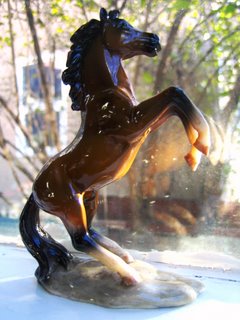 I have TOO MANY little projects on the go at one time. I'm still messing about with the car, the desk is STILL not done, I have yet to build a stand for the unicorn, and then there is that screen made out of wallpaper samples and trim, which sounds terrible, I know, but trust me, when it's done, it will seem like a piece of classic Augustan furnishing. Then there is the house on 78 Ave, which is going to take some serious work on the painting side, and there's that one bench which J and I are planning to refurbish, and soon enough, moving day. Moving day! I can hardly believe it. And school is starting up again. Try balancing all of that with a blog and a novel—two novels, actually. And my brothers' birthday is this week-end. And, with a little bit of luck, a new job will start up for me. Because I need another casual job, dammit, for gas and rent.
I have TOO MANY little projects on the go at one time. I'm still messing about with the car, the desk is STILL not done, I have yet to build a stand for the unicorn, and then there is that screen made out of wallpaper samples and trim, which sounds terrible, I know, but trust me, when it's done, it will seem like a piece of classic Augustan furnishing. Then there is the house on 78 Ave, which is going to take some serious work on the painting side, and there's that one bench which J and I are planning to refurbish, and soon enough, moving day. Moving day! I can hardly believe it. And school is starting up again. Try balancing all of that with a blog and a novel—two novels, actually. And my brothers' birthday is this week-end. And, with a little bit of luck, a new job will start up for me. Because I need another casual job, dammit, for gas and rent.
Who else, btw, is going to the Wolf Parade show? This heart's starting to feel the fire. I hope the sound, this time, will not be a problem. Spencer Krug! Dan Boekner! Oh, it will be good.
"A New Law" + Derek Webb She volunteers for things, your one friend, but that's not the important part—you've got tons of friends who volunteer for Oxfam or soup-kitchens or that Fashion 4 Cancer stuff. She doesn't volunteer to make herself feel better, or because volunteering is in vogue, or even because she's a good person and that's what good people do, a good person's duty. She's living in a different place, and in that place, where colours are just a bit more clear-edged, where black and white never bleed into one another, serving is loving, and she is full of love. And she is honest. And clean. And she is always shaping a better, stronger, more durable connection between everyone around her. Well, you don't need to be around her, but when you are, you feel better, cleaner, and, maybe, uncomfortable, too. This song by Derek Webb is like your friend, and she's talking to you. This is a gently bitter song, an emotionally honest song, a song for people who want to be better, but don't want to work very hard to be good. They're satisfied ("them", I say, surely not you or I) with staying in the valley—"I don't wanna know if the answers aren't easy / so just bring it down from the mountain to me"—and life on the surface is a very fine life. No thinking, no sweating, no understanding. Honest ignorance is honest bliss. This song strips away ignorance. This song leaves no excuse for each listener to not work for a better connection with something purer than oneself. With God, alright? This song makes goodness for the sake of goodness nearly irrelevant. There's nothing new, musically, here. Nothing inventive or outstanding. The piano, the guitar, are just a well-framed nest for that slightly-scratchy voice. But the lyrics, for anyone not whole-heartedly striving to better themselves, are a gun against your temple, absolute condemnation. An axe against your roots. I can feel the cold press of the barrel right now, the blade biting deep.
This song is off Derek Webb's 2005 solo release, Mockingbird. Not the easiest album to track down, but well worth the time, the money, the listening.
Bonus dl: "Mockingbird".
The Prestige + Christopher Priest This book is ill-served by the Gollancz reissue cover—a pallid picture of a tuxedoed man adjusting his cravat in front of a mirror out of which looks not his reflection but another man, top-hatted, pleasant, vapid. Done in washed-out grays and pale yellow, no one would pick this book from the shelf based on its cover. Listen, this book has been nominated for a total of five awards and won two. An amazing novel, brilliant construction. This book is all Jekyll and Hyde and The Mystery Of Edwin Drood and Connie-Willis-style science fiction (and, please, if you're unaware of Connie Willis, my God, do yourself the enormous favour of reading To Say Nothing Of The Dog as soon as possible—though Lincoln's Dreams, I must confess, is by far my favourite Willis novel, flawed though it may be). So the cover is not the book, which, strangely, fits the theme of the book very well. Do you want to know the heart of this book? One sentence, then, one sentence: "There had been someone standing inside that chamber, silently, motionlessly, just beyond my line of sight, waiting for me to either enter or retreat." That still sinister space between action and consequence, the idea of something not known, a waiting shape, forms the eerie bias of this book. What is real and what is seen to be real, and the consequences of the miscommunication which arise between the two, form the engine of this novel—and it's a powerful engine, indeed. Two magicians come up with the same trick, a spectacular transposition of the performer's body. He is here, and then he is there. He walks in one door and out another. He disappears in a blaze of electricity and immediately appears elsewhere under a halo of spotlights. There is no solving how either magician works his magic. False images, doppelgangers, scarred doubles, William Wilsons, this novel has them all in spades. Miscommunication is piled upon miscommunication, insult upon insult, deceit upon deceit, until neither magician seems to know who, exactly, he himself really is! So their lives are ruined forever, and the lives of their children after them.
 To the readers who didn't stop checking back, thank-you. Specially to that large block from the Indonesia-ish area, and all les habitants from New England. Anonymous to anonymous, thank-you. It has been a long hiatus here in internet-land, but, as you know, or perhaps don't, I have no regular access to a computer. Not for foolishness like a blog, at least. Well, that situation should be fixed after Christmas.
To the readers who didn't stop checking back, thank-you. Specially to that large block from the Indonesia-ish area, and all les habitants from New England. Anonymous to anonymous, thank-you. It has been a long hiatus here in internet-land, but, as you know, or perhaps don't, I have no regular access to a computer. Not for foolishness like a blog, at least. Well, that situation should be fixed after Christmas.





















